人教版高中英语必修5Unit 1 Great scientists Language points课件(59张ppt)
文档属性
| 名称 | 人教版高中英语必修5Unit 1 Great scientists Language points课件(59张ppt) |  | |
| 格式 | zip | ||
| 文件大小 | 1.1MB | ||
| 资源类型 | 教案 | ||
| 版本资源 | 人教版(新课程标准) | ||
| 科目 | 英语 | ||
| 更新时间 | 2020-07-07 16:12:21 | ||
图片预览


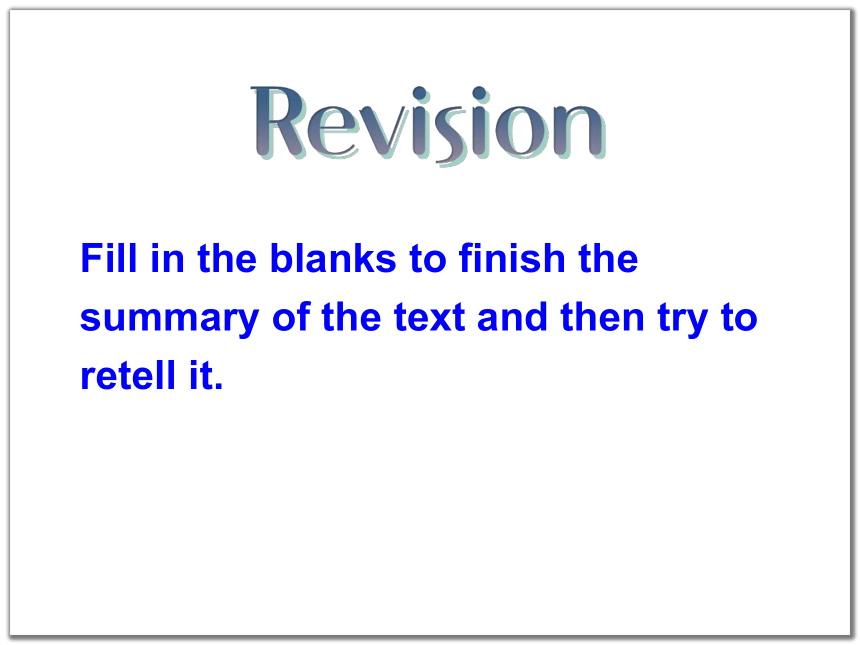
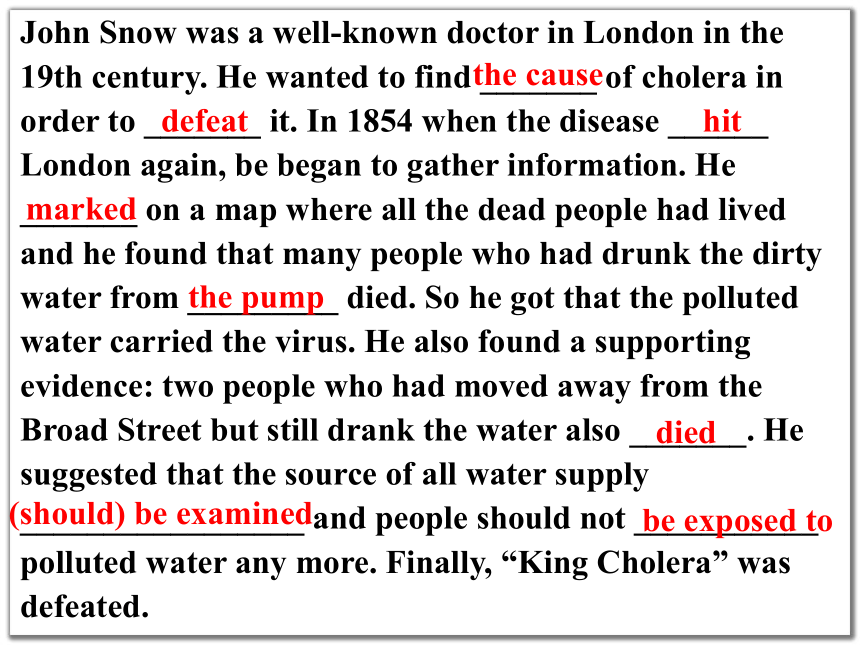

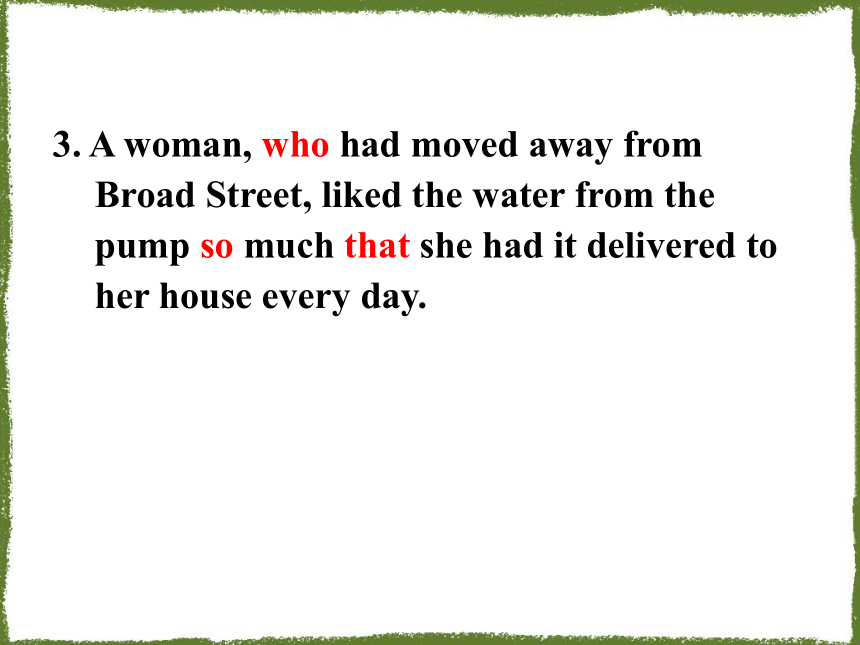
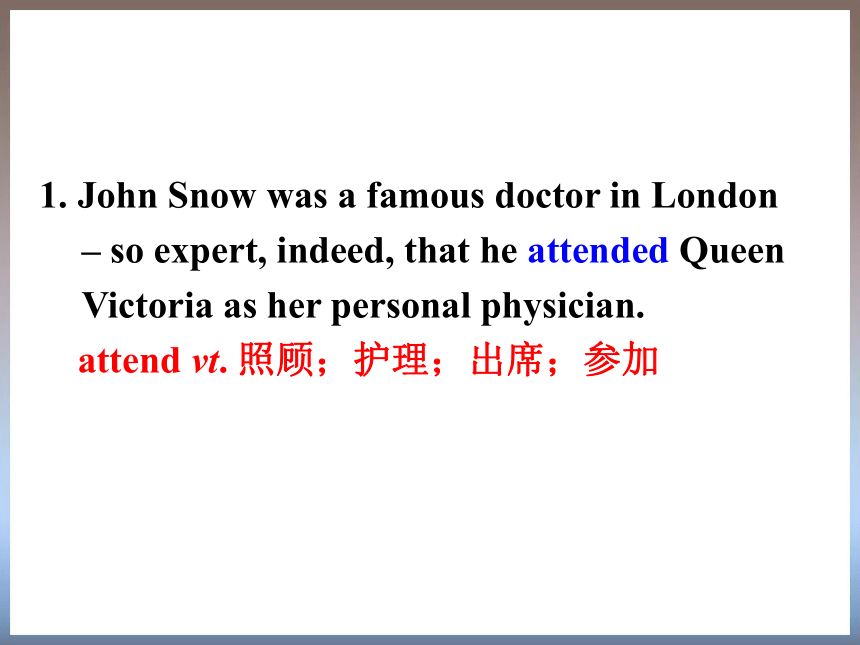
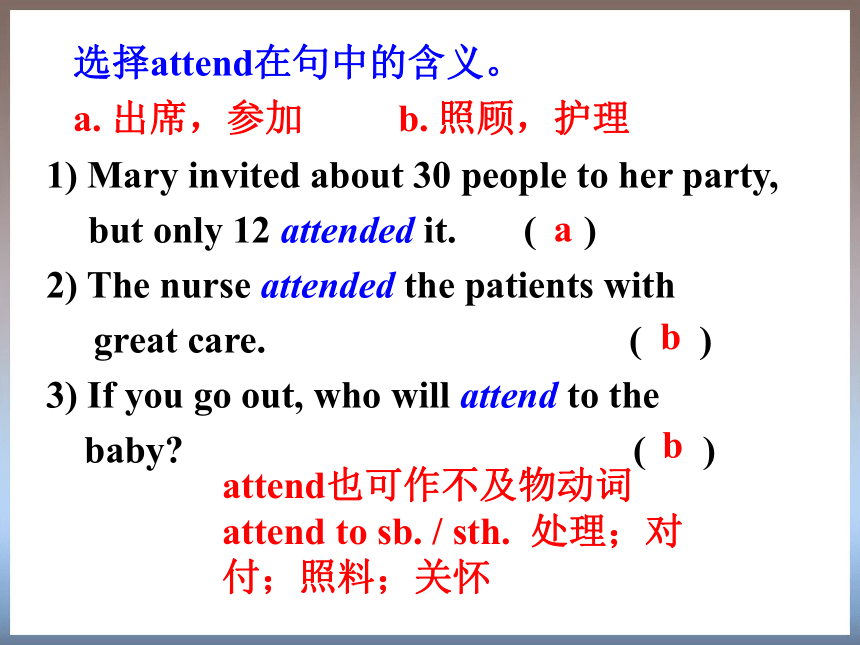
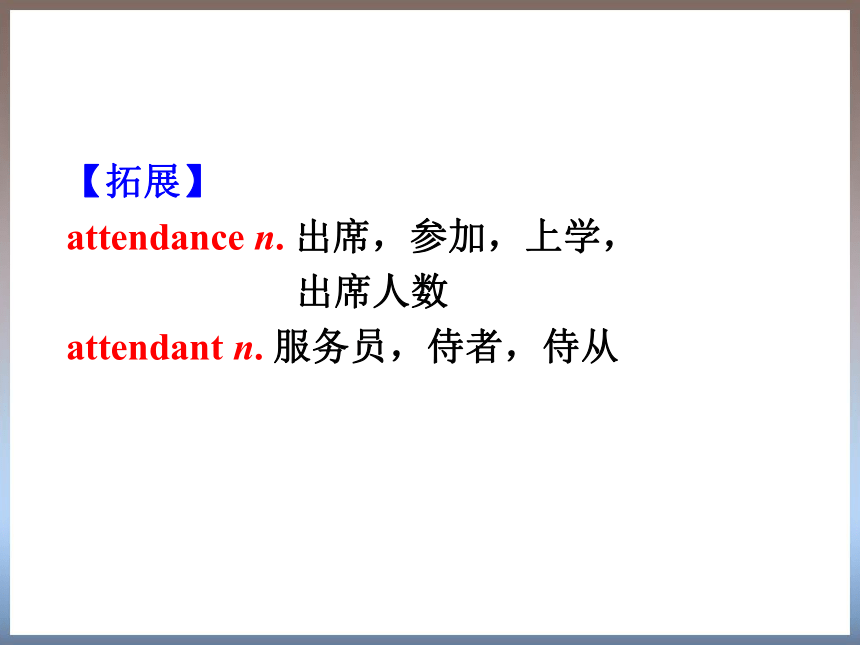
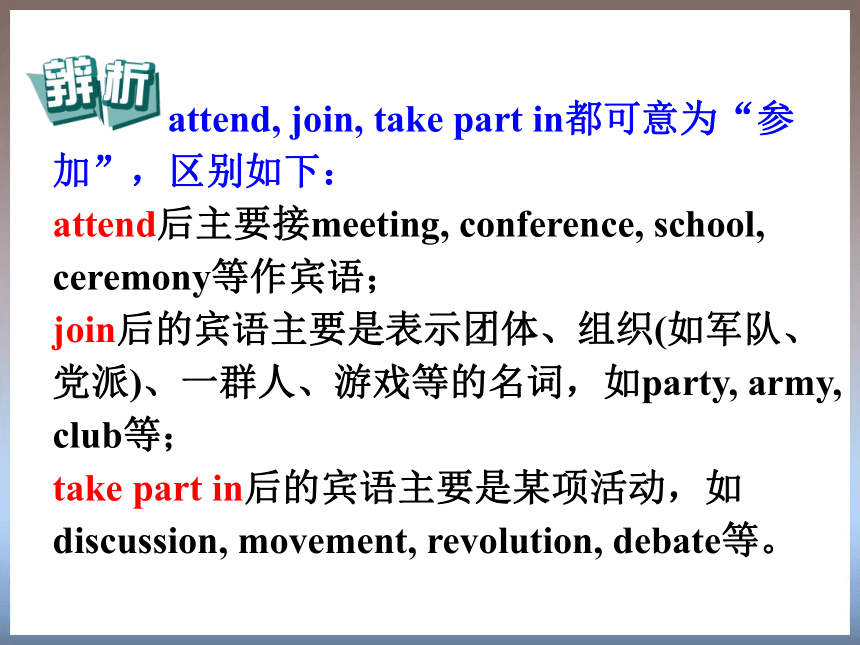
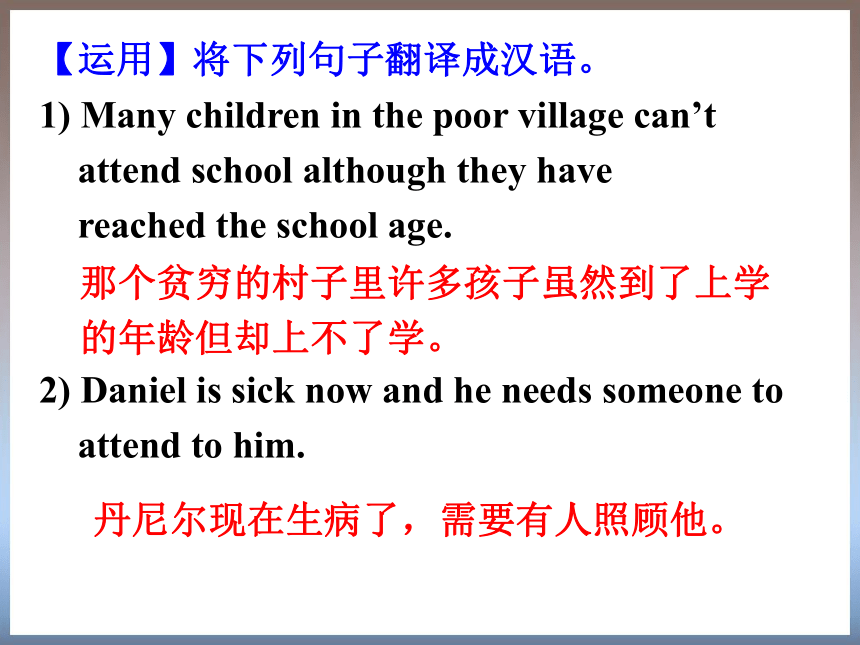
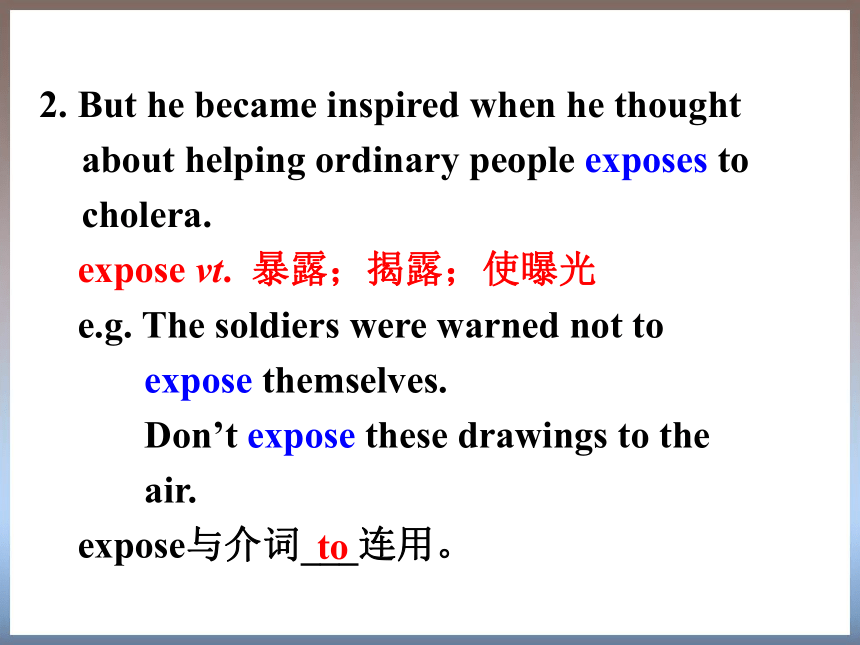
文档简介
(共59张PPT)
Fill
in
the
blanks
to
finish
the
summary
of
the
text
and
then
try
to
retell
it.
John
Snow
was
a
well-known
doctor
in
London
in
the
19th
century.
He
wanted
to
find
_______
of
cholera
in
order
to
_______
it.
In
1854
when
the
disease
______
London
again,
be
began
to
gather
information.
He
_______
on
a
map
where
all
the
dead
people
had
lived
and
he
found
that
many
people
who
had
drunk
the
dirty
water
from
_________
died.
So
he
got
that
the
polluted
water
carried
the
virus.
He
also
found
a
supporting
evidence:
two
people
who
had
moved
away
from
the
Broad
Street
but
still
drank
the
water
also
_______.
He
suggested
that
the
source
of
all
water
supply
_________________
and
people
should
not
___________
polluted
water
any
more.
Finally,
“King
Cholera”
was
defeated.
the
cause
marked
defeat
hit
the
pump
be
exposed
to
(should)
be
examined
died
Useful
words
and
sentences:
attend,
expose,
cure,
absorb,
severe,
pump,
blame,
handle,
link,
announce,
instruct
1.
So
many
thousands
of
terrified
people
died
every
time
there
was
an
outbreak.
2.
He
became
interested
in
two
theories
that
possibly
explained
how
cholera
killed
people.
3.
A
woman,
who
had
moved
away
from
Broad
Street,
liked
the
water
from
the
pump
so
much
that
she
had
it
delivered
to
her
house
every
day.
1.
John
Snow
was
a
famous
doctor
in
London
–
so
expert,
indeed,
that
he
attended
Queen
Victoria
as
her
personal
physician.
attend
vt.
照顾;护理;出席;参加
选择attend在句中的含义。
出席,参加
b.
照顾,护理
1)
Mary
invited
about
30
people
to
her
party,
but
only
12
attended
it.
(
)
2)
The
nurse
attended
the
patients
with
great
care.
(
)
3)
If
you
go
out,
who
will
attend
to
the
baby?
(
)
a
b
b
attend也可作不及物动词
attend
to
sb.
/
sth.
处理;对付;照料;关怀
【拓展】
attendance
n.
出席,参加,上学,
出席人数
attendant
n.
服务员,侍者,侍从
attend,
join,
take
part
in都可意为“参加”,区别如下:
attend后主要接meeting,
conference,
school,
ceremony等作宾语;
join后的宾语主要是表示团体、组织(如军队、党派)、一群人、游戏等的名词,如party,
army,
club等;
take
part
in后的宾语主要是某项活动,如discussion,
movement,
revolution,
debate等。
【运用】将下列句子翻译成汉语。
1)
Many
children
in
the
poor
village
can’t
attend
school
although
they
have
reached
the
school
age.
2)
Daniel
is
sick
now
and
he
needs
someone
to
attend
to
him.
丹尼尔现在生病了,需要有人照顾他。
那个贫穷的村子里许多孩子虽然到了上学的年龄但却上不了学。
2.
But
he
became
inspired
when
he
thought
about
helping
ordinary
people
exposes
to
cholera.
expose
vt.
暴露;揭露;使曝光
e.g.
The
soldiers
were
warned
not
to
expose
themselves.
Don’t
expose
these
drawings
to
the
air.
expose与介词___连用。
to
The
report
exposes
the
weaknesses
of
modern
medical
practice.
Mary’s
beauty
will
expose
her
to
many
dangers.
expose“使面临,使遭受(危险或不快)”。
It
is
said
that
the
film
has
been
exposed.
expose可意为“使曝光”。
意为___________
揭露,揭穿
【拓展】exposure
n.?暴露,揭露
翻译下列句子。
1)
Don’t
expose
babies
to
strong
sunlight.
2)
The
girl
didn’t
want
to
expose
her
fears
to
anyone.
不要把婴儿暴露在烈日下。
这位女孩不想向任何人显露她的恐惧。
3.
Neither
its
cause
nor
its
cure
was
understood.
cure既可作名词,也可作动词。
e.g.
Her
cure
took
six
weeks.
There
is
no
certain
cure
for
this
disease.
cure作名词时,意为“治愈,痊愈”;也
可意为“药,药物,疗法”,常与介词
______连用。
for
This
medicine
should
cure
you
of
your
cold.
cure作动词时,意为“治愈,治好(病人或动物)”,常构成搭配_____________;
Many
types
of
cancer
can
now
be
cured.
cure也可意为“治好(疾病)”。
cure
sb.
of
sth.
When
you
have
a
pain
in
your
shoulders,
you
will
go
to
see
a
doctor.
The
doctor
will
cure
you.
He
will
cure
the
pain
in
your
shoulders.
Aspirin
is
said
to
be
a
wonderful
cure
for
the
pain.
给出cure的中文含义。
v.
治愈
n.
疗法
v.
治愈
4.
The
second
suggested
that
people
absorbed
this
disease
into
their
bodies
with
their
meals.
e.g.
Clever
children
absorb
knowledge
easily.
聪明的孩子吸收知识快。
absorb
吸收;
吸引;
使专心;
合并;
吞并
Aspirin
is
quickly
absorbed
by
/into
the
body.
阿司匹林被身体吸收很快。
be
absorbed
by,
absorb
…
into
意为
________________________________
e.g.
The
big
company
has
gradually
absorbed
these
small
companies
into
its
own
organization.
这家大公司逐渐将这些小公司吞并了。
被……吞并;为……所吸收?
He
is
absorbed
in
the
research
of
Chinese
history
recently.
他最近专心于研究中国历史。
be
absorbed
in
=
concentrate
on
表示“______________”。
专心于某事
absorb
one’s
attention
吸引某人的注意力
e.g.
Chinese
history
absorbs
his
attention
recently.
5.
In
two
particular
streets,
the
cholera
outbreak
was
so
severe
that
more
than
500
people
died
in
ten
days.
severe
adj.
严重的;剧烈的;严厉的
severe当意为“严重的;严肃的”时,和serious相近;当意为“严厉的;严格的”时,与strict相近。
be
severe
on
(upon)
/
with
sb.
对某人严厉或严格
e.g.
The
drought
is
becoming
increasingly
severe.
旱灾日趋严重。
He
______________
his
children.
他对子女很严格。
You
are
too
_______________
the
boy.
你对那个男孩太严厉了。
I
felt
a
severe
pain
in
the
chest.
我感到胸口剧烈疼痛。
is
severe
with
severe
on
(upon)
表示“伤势严重”要用severe,
不用serious;
但指“疾病严重”时,
两者都可与illness连接。
e.g.
She
received
_______
head
injuries
in
the
accident.
在事故中她的头部受了重伤。
I
was
laid
up
for
six
weeks
with
a
severe
/serious
illness.
由于重病,我卧床六个星期。
此句不可用serious。
severe
6.
Many
of
the
deaths
were
near
the
water
pump
in
Broad
Street
(especially
numbers
16,
37,
38
and
40).
pump
n.
泵
(油泵;
气泵),
抽水机,
打气筒
If
have
a
flat
tyre,
you
will
pump
air
into
the
tyre.
(You
will
pump
up
your
tyre.)
When
my
car
was
short
of
gas,
I
went
to
the
gas
station,
where
the
guy
pumped
gas.
根据例句给出pump的含义。
v.
打气
v.
打气
We
had
a
debate
yesterday.
The
lively
debate
really
pumped
us
up.
His
heart
was
pumping
fast.
During
the
drought
last
year,
the
villagers
had
pumped
the
well
dry,
but
got
no
more
water.
v.
给……打气
v.
心跳
v.
把井水抽干
6.
It
seemed
that
the
water
was
to
blame.
观察blame在句中的词性、含义及用法。
1)
Many
children
are
afraid
of
being
blamed
for
making
mistakes
in
speaking
English.
blame作动词,意为“责备;谴责”,blame
sb.
/
sth.
_____
sth.
因某事而指责某人/某事
for
2)
It’s
no
use
blaming
our
defeat
on
the
player.
_____________________
把某事归咎于某人/某事
3)
It’s
you
who
are
to
blame
for
the
accident.
_____________________
对某事负有责任(主动表被动)
blame
sth.
on
sb.
/
sth.
be
to
blame
for
sth.
4)
You
must
take
the
blame
for
the
mistakes
in
the
report.
blame作名词,意为“过失;责备”,take
the
blame
承担责任。
5)
The
boss
always
puts
the
blame
for
the
failure
on
us.
put
the
blame
for
sth.
on
sb.
把某事归咎于某人。
【运用】将下列句子翻译成英语。
1)
那次事故怪不着孩子们。
2)
警察把那起交通事故归咎于杰克的粗心
驾驶。
The
police
blamed
the
traffic
accident
on
Jack’s
careless
driving.
The
children
were
not
to
blame
for
the
accident.
7.
He
immediately
told
the
astonished
people
in
Broad
Street
to
remove
the
handle
from
the
pump
so
that
it
could
not
be
used.
handle
n.
柄;把手
handle
v.
Choose
the
Chinese
explanations
in
the
box.
A.
操作;
运用
B.
经销;
买卖
C.
管理
D.
对待
E.
应付
F.
控制;
管
1)
Ms
Hawkins,
the
chief
accountant
of
the
company
handles
the
company’s
accounts.
C.
管理
2)
The
children
are
so
naughty
that
I
can’t
handle
them.
3)
She
handled
a
difficult
argument
skillfully.
F.
控制;
管
E.
应付
A.
操作;
运用
B.
经销;
买卖
C.
管理
D.
对待
E.
应付
F.
控制;
管
4)
Handle
children
kindly,
if
you
want
them
to
trust
you.
5)
This
shop
handles
paper
and
stationery.
6)
He
learnt
how
to
handle
the
axe.
D.
对待
B.
经销;买卖
A.
操作;运用
A.
操作;
运用
B.
经销;
买卖
C.
管理
D.
对待
E.
应付
F.
控制;
管
8.
In
another
part
of
London,
he
found
supporting
evidence
from
two
other
deaths
that
were
linked
to
the
Broad
Street
outbreak.
e.g.
A
lot
of
links
fitted
together
form
a
chain.
link
n.
(链状物的)环,
节
研究人员发现了吸烟和心脏病之间的关系。
Researchers
have
detected
a
link
between
smoking
and
heart
disease.
link
n.
联系
The
two
towns
are
linked
by
a
railway.
The
new
bridge
will
link
the
island
to
the
mainland.
link
v.
连接
9.
With
this
extra
evidence
John
Snow
was
able
to
announce
with
certainty
that
polluted
water
carried
the
virus.
e.g.
They
have
announced
the
date
of
their
wedding
in
the
newspaper.
She
announced
that
she
has
no
intention
of
leaving
her
husband.
announce作____词,意为“______
_____”,后可接名词或that从句。
动
宣布、
通告
Gathering
clouds
announced
the
oncoming
storm.
announce为“预示”。
【拓展】
announcement
n.?
宣告、布告、通告、宣布,可数名词
announcer
n.?
广播员、报幕员
10.
The
water
companies
were
instructed
not
to
expose
people
to
polluted
water
any
more.
instruct
vt.
命令;指示;嘱咐;吩咐;教导(教授知识或技术);训练
【拓展】
instructor
n.
教员;教练)
instruction
n.
(命令;指示;说明)。
e.g.
The
teacher
instructed
him
to
start
early.
老师命令他早动身。
I’ve
been
instructed
to
wait
here
until
the
lecturer
arrives.
我得到指示在这儿等到讲课老师到来。
He
instructs
a
class
in
history.
他教授一个班的历史。
Read
the
instructions
on
the
pocket.
看一下袋子上的说明。
instruct指向一个人或一组人传授知识,
但并不清楚他们是否学到什么。
teach是最普通的词,
可指或不指学术方面的学习;
作不及物动词时,
表示教书生涯。
tutor指一学生与一老师的关系,
常指课外的一个教师对一个学生的补习工作。
educate指范围更广泛的学术过程,
完成比teach更大的结果。
train指使一个人或一组人在某一专门的技能或职业方面达到必要的水平,
也可指训练动物。
coach
指在普通的教育体系之外训练或培养一个人或一组人,
常为了通过某项专门的考试。
e.g.
I
taught
history
for
many
years.
我教历史好多年了。
Who
taught
you
to
ride
a
bicycle?
谁教你骑自行车的?
He
instructed
us
in
English,
but
some
of
them
made
little
progress.
他教我们英语,但我们有些人几乎
没有进步。
In
his
spare
time,
he
tutored
me
in
English.
在课余时间,他教我英语。
The
writer
was
educated
at
a
very
good
school.
这位作家在一所很好的学校里受过教育。
It
takes
several
years
to
train
a
doctor.
培养一名医生要花好几年时间。
He
coached
her
for
the
English
examination.
他辅导她英语考试。
So
many
thousands
of
terrified
people
died
every
time
there
was
an
outbreak.
每次暴发霍乱时,就有大批惊恐的老百姓病死。
①本句是一个主从复合句。
②主句是So
many
thousands
of
terrified
people
died;every
time引导________从句。
时间状语
③
every
time作连词,意为“每次,每
当”
。
注意:immediately,
the
moment,
directly,
instantly等与every
time一样,都可以用作连词引导时间状语从句,意为“一……就”。
【仿写】每当听到这首歌,她都会忍不住哭起来。
She
couldn’t
help
crying
/
bursting
into
tears
every
time
she
heard
the
song.
2.
He
became
interested
in
two
theories
that
possibly
explained
how
cholera
killed
people.
他对可能解释霍乱致人死亡的两种推测都很感兴趣。
①本句是一个主从复合句。
②主句是He
became
interested
in
two
theories;that引导定语从句,修饰先行词________,且在从句中作______。
theories
主语
③该定语从句中又包含一个由how引导的_______从句。
【仿写】约翰决定买那本描述地球上生命起
源的书。
___________________________________
__________________________________
宾语
John
decided
to
buy
the
book
that
described
how
life
began
on
the
earth.
3.
A
woman,
who
had
moved
away
from
Broad
Street,
liked
the
water
from
the
pump
so
much
that
she
had
it
delivered
to
her
house
every
day.
有一位妇女是从宽街搬过来的,她特别喜欢那里的水,每天都要派人从水泵打水运到家里来。
①本句是一个主从复合句。
②主句的主干是A
woman
liked
the
water;who引导非限制性定语从句,对________
进行补充说明。
③so
...
that
...在此引导_________从句。
④had
it
delivered是have
sth.
done结构,在此意为“让/请别人做某事”。
woman
结果状语
【仿写】五年前从这个街区搬走的梅变了好多,刚才我几乎没认出她来。
Mei,
who
moved
from
the
neighbourhood
five
years
ago,
had
changed
so
much
that
I
almost
didn’t
recognise
her
just
now.
draw
a
conclusion
expose
…
to
link
…
to
…
absorb…into…
look
into
slow
down
die
of…
得出结论
使显露;暴露
将……和……联系或连接起来
吸收
调查
减慢
死于……
I.?根据下面各句句意以及所给单词的首字母或汉语提示词,写出该单词的正确形式(每空一词)。
1.
The
local
people
complain
that
chemical
waste
from
factories
is
p________
the
river.
2.
The
children
are
the
helpless
________
(受
害者)
of
the
fighting.
3.
In
cold
climates,
houses
need
to
have
walls
that
will
a________
heat.
polluting
victims
absorb
4.
Please
let
us
know
if
you
are
unable
to
a________
the
meeting.
5.
The
government
has
___________
(宣布)
that
public
spending
will
be
increased.
6.
The
need
to
communicate
is
a
key
_____________
(特征)
of
human
society.
7.
The
clear
reasons
for
the
disaster
are
difficult
to
________
(分析).
8.
There
were
lots
of
kids
in
my
___________
(附近)
when
I
was
growing
up.
attend
announced
characteristic
analyse??
neighbourhood
II.?用适当的介词或副词填空。
1.
Do
not
expose
babies
________
strong
sunlight.
2.
John
didn’t
seem
very
interested
________
what
I
was
saying.
3.
His
back
injury
may
prevent
him
________
playing
in
tomorrow’s
game.
4.
The
train
slowed
________
as
it
approached
the
station.
5.
I
need
to
find
________
more
about
these
night
courses.
6.
I
wrote
a
letter
of
complaint
and
the
airline
has
promised
to
look
________
the
matter.
to
in
from
down
out
into
Ⅲ.
根据括号内的汉语提示补全下面句子(每空一词)。
1.
___________
________
________
________
________
________
(每次听那首歌)
I
feel
happy.
2.
At
yesterday’s
meeting,
he
________
________
________
________
________
(提出了一项新的计划).
Every
/
Each
time
I
hear
that
song
put
forward
a
new
plan
3.
After
reading
her
letter,
I
_____________
________
___________
(得出结论)
that
she
was
a
very
intelligent
person.
4.
I
________
____________
________
(决心)
do
better
than
Mike.
drew
/
reached
the
conclusion
am
determined
to
Fill
in
the
blanks
to
finish
the
summary
of
the
text
and
then
try
to
retell
it.
John
Snow
was
a
well-known
doctor
in
London
in
the
19th
century.
He
wanted
to
find
_______
of
cholera
in
order
to
_______
it.
In
1854
when
the
disease
______
London
again,
be
began
to
gather
information.
He
_______
on
a
map
where
all
the
dead
people
had
lived
and
he
found
that
many
people
who
had
drunk
the
dirty
water
from
_________
died.
So
he
got
that
the
polluted
water
carried
the
virus.
He
also
found
a
supporting
evidence:
two
people
who
had
moved
away
from
the
Broad
Street
but
still
drank
the
water
also
_______.
He
suggested
that
the
source
of
all
water
supply
_________________
and
people
should
not
___________
polluted
water
any
more.
Finally,
“King
Cholera”
was
defeated.
the
cause
marked
defeat
hit
the
pump
be
exposed
to
(should)
be
examined
died
Useful
words
and
sentences:
attend,
expose,
cure,
absorb,
severe,
pump,
blame,
handle,
link,
announce,
instruct
1.
So
many
thousands
of
terrified
people
died
every
time
there
was
an
outbreak.
2.
He
became
interested
in
two
theories
that
possibly
explained
how
cholera
killed
people.
3.
A
woman,
who
had
moved
away
from
Broad
Street,
liked
the
water
from
the
pump
so
much
that
she
had
it
delivered
to
her
house
every
day.
1.
John
Snow
was
a
famous
doctor
in
London
–
so
expert,
indeed,
that
he
attended
Queen
Victoria
as
her
personal
physician.
attend
vt.
照顾;护理;出席;参加
选择attend在句中的含义。
出席,参加
b.
照顾,护理
1)
Mary
invited
about
30
people
to
her
party,
but
only
12
attended
it.
(
)
2)
The
nurse
attended
the
patients
with
great
care.
(
)
3)
If
you
go
out,
who
will
attend
to
the
baby?
(
)
a
b
b
attend也可作不及物动词
attend
to
sb.
/
sth.
处理;对付;照料;关怀
【拓展】
attendance
n.
出席,参加,上学,
出席人数
attendant
n.
服务员,侍者,侍从
attend,
join,
take
part
in都可意为“参加”,区别如下:
attend后主要接meeting,
conference,
school,
ceremony等作宾语;
join后的宾语主要是表示团体、组织(如军队、党派)、一群人、游戏等的名词,如party,
army,
club等;
take
part
in后的宾语主要是某项活动,如discussion,
movement,
revolution,
debate等。
【运用】将下列句子翻译成汉语。
1)
Many
children
in
the
poor
village
can’t
attend
school
although
they
have
reached
the
school
age.
2)
Daniel
is
sick
now
and
he
needs
someone
to
attend
to
him.
丹尼尔现在生病了,需要有人照顾他。
那个贫穷的村子里许多孩子虽然到了上学的年龄但却上不了学。
2.
But
he
became
inspired
when
he
thought
about
helping
ordinary
people
exposes
to
cholera.
expose
vt.
暴露;揭露;使曝光
e.g.
The
soldiers
were
warned
not
to
expose
themselves.
Don’t
expose
these
drawings
to
the
air.
expose与介词___连用。
to
The
report
exposes
the
weaknesses
of
modern
medical
practice.
Mary’s
beauty
will
expose
her
to
many
dangers.
expose“使面临,使遭受(危险或不快)”。
It
is
said
that
the
film
has
been
exposed.
expose可意为“使曝光”。
意为___________
揭露,揭穿
【拓展】exposure
n.?暴露,揭露
翻译下列句子。
1)
Don’t
expose
babies
to
strong
sunlight.
2)
The
girl
didn’t
want
to
expose
her
fears
to
anyone.
不要把婴儿暴露在烈日下。
这位女孩不想向任何人显露她的恐惧。
3.
Neither
its
cause
nor
its
cure
was
understood.
cure既可作名词,也可作动词。
e.g.
Her
cure
took
six
weeks.
There
is
no
certain
cure
for
this
disease.
cure作名词时,意为“治愈,痊愈”;也
可意为“药,药物,疗法”,常与介词
______连用。
for
This
medicine
should
cure
you
of
your
cold.
cure作动词时,意为“治愈,治好(病人或动物)”,常构成搭配_____________;
Many
types
of
cancer
can
now
be
cured.
cure也可意为“治好(疾病)”。
cure
sb.
of
sth.
When
you
have
a
pain
in
your
shoulders,
you
will
go
to
see
a
doctor.
The
doctor
will
cure
you.
He
will
cure
the
pain
in
your
shoulders.
Aspirin
is
said
to
be
a
wonderful
cure
for
the
pain.
给出cure的中文含义。
v.
治愈
n.
疗法
v.
治愈
4.
The
second
suggested
that
people
absorbed
this
disease
into
their
bodies
with
their
meals.
e.g.
Clever
children
absorb
knowledge
easily.
聪明的孩子吸收知识快。
absorb
吸收;
吸引;
使专心;
合并;
吞并
Aspirin
is
quickly
absorbed
by
/into
the
body.
阿司匹林被身体吸收很快。
be
absorbed
by,
absorb
…
into
意为
________________________________
e.g.
The
big
company
has
gradually
absorbed
these
small
companies
into
its
own
organization.
这家大公司逐渐将这些小公司吞并了。
被……吞并;为……所吸收?
He
is
absorbed
in
the
research
of
Chinese
history
recently.
他最近专心于研究中国历史。
be
absorbed
in
=
concentrate
on
表示“______________”。
专心于某事
absorb
one’s
attention
吸引某人的注意力
e.g.
Chinese
history
absorbs
his
attention
recently.
5.
In
two
particular
streets,
the
cholera
outbreak
was
so
severe
that
more
than
500
people
died
in
ten
days.
severe
adj.
严重的;剧烈的;严厉的
severe当意为“严重的;严肃的”时,和serious相近;当意为“严厉的;严格的”时,与strict相近。
be
severe
on
(upon)
/
with
sb.
对某人严厉或严格
e.g.
The
drought
is
becoming
increasingly
severe.
旱灾日趋严重。
He
______________
his
children.
他对子女很严格。
You
are
too
_______________
the
boy.
你对那个男孩太严厉了。
I
felt
a
severe
pain
in
the
chest.
我感到胸口剧烈疼痛。
is
severe
with
severe
on
(upon)
表示“伤势严重”要用severe,
不用serious;
但指“疾病严重”时,
两者都可与illness连接。
e.g.
She
received
_______
head
injuries
in
the
accident.
在事故中她的头部受了重伤。
I
was
laid
up
for
six
weeks
with
a
severe
/serious
illness.
由于重病,我卧床六个星期。
此句不可用serious。
severe
6.
Many
of
the
deaths
were
near
the
water
pump
in
Broad
Street
(especially
numbers
16,
37,
38
and
40).
pump
n.
泵
(油泵;
气泵),
抽水机,
打气筒
If
have
a
flat
tyre,
you
will
pump
air
into
the
tyre.
(You
will
pump
up
your
tyre.)
When
my
car
was
short
of
gas,
I
went
to
the
gas
station,
where
the
guy
pumped
gas.
根据例句给出pump的含义。
v.
打气
v.
打气
We
had
a
debate
yesterday.
The
lively
debate
really
pumped
us
up.
His
heart
was
pumping
fast.
During
the
drought
last
year,
the
villagers
had
pumped
the
well
dry,
but
got
no
more
water.
v.
给……打气
v.
心跳
v.
把井水抽干
6.
It
seemed
that
the
water
was
to
blame.
观察blame在句中的词性、含义及用法。
1)
Many
children
are
afraid
of
being
blamed
for
making
mistakes
in
speaking
English.
blame作动词,意为“责备;谴责”,blame
sb.
/
sth.
_____
sth.
因某事而指责某人/某事
for
2)
It’s
no
use
blaming
our
defeat
on
the
player.
_____________________
把某事归咎于某人/某事
3)
It’s
you
who
are
to
blame
for
the
accident.
_____________________
对某事负有责任(主动表被动)
blame
sth.
on
sb.
/
sth.
be
to
blame
for
sth.
4)
You
must
take
the
blame
for
the
mistakes
in
the
report.
blame作名词,意为“过失;责备”,take
the
blame
承担责任。
5)
The
boss
always
puts
the
blame
for
the
failure
on
us.
put
the
blame
for
sth.
on
sb.
把某事归咎于某人。
【运用】将下列句子翻译成英语。
1)
那次事故怪不着孩子们。
2)
警察把那起交通事故归咎于杰克的粗心
驾驶。
The
police
blamed
the
traffic
accident
on
Jack’s
careless
driving.
The
children
were
not
to
blame
for
the
accident.
7.
He
immediately
told
the
astonished
people
in
Broad
Street
to
remove
the
handle
from
the
pump
so
that
it
could
not
be
used.
handle
n.
柄;把手
handle
v.
Choose
the
Chinese
explanations
in
the
box.
A.
操作;
运用
B.
经销;
买卖
C.
管理
D.
对待
E.
应付
F.
控制;
管
1)
Ms
Hawkins,
the
chief
accountant
of
the
company
handles
the
company’s
accounts.
C.
管理
2)
The
children
are
so
naughty
that
I
can’t
handle
them.
3)
She
handled
a
difficult
argument
skillfully.
F.
控制;
管
E.
应付
A.
操作;
运用
B.
经销;
买卖
C.
管理
D.
对待
E.
应付
F.
控制;
管
4)
Handle
children
kindly,
if
you
want
them
to
trust
you.
5)
This
shop
handles
paper
and
stationery.
6)
He
learnt
how
to
handle
the
axe.
D.
对待
B.
经销;买卖
A.
操作;运用
A.
操作;
运用
B.
经销;
买卖
C.
管理
D.
对待
E.
应付
F.
控制;
管
8.
In
another
part
of
London,
he
found
supporting
evidence
from
two
other
deaths
that
were
linked
to
the
Broad
Street
outbreak.
e.g.
A
lot
of
links
fitted
together
form
a
chain.
link
n.
(链状物的)环,
节
研究人员发现了吸烟和心脏病之间的关系。
Researchers
have
detected
a
link
between
smoking
and
heart
disease.
link
n.
联系
The
two
towns
are
linked
by
a
railway.
The
new
bridge
will
link
the
island
to
the
mainland.
link
v.
连接
9.
With
this
extra
evidence
John
Snow
was
able
to
announce
with
certainty
that
polluted
water
carried
the
virus.
e.g.
They
have
announced
the
date
of
their
wedding
in
the
newspaper.
She
announced
that
she
has
no
intention
of
leaving
her
husband.
announce作____词,意为“______
_____”,后可接名词或that从句。
动
宣布、
通告
Gathering
clouds
announced
the
oncoming
storm.
announce为“预示”。
【拓展】
announcement
n.?
宣告、布告、通告、宣布,可数名词
announcer
n.?
广播员、报幕员
10.
The
water
companies
were
instructed
not
to
expose
people
to
polluted
water
any
more.
instruct
vt.
命令;指示;嘱咐;吩咐;教导(教授知识或技术);训练
【拓展】
instructor
n.
教员;教练)
instruction
n.
(命令;指示;说明)。
e.g.
The
teacher
instructed
him
to
start
early.
老师命令他早动身。
I’ve
been
instructed
to
wait
here
until
the
lecturer
arrives.
我得到指示在这儿等到讲课老师到来。
He
instructs
a
class
in
history.
他教授一个班的历史。
Read
the
instructions
on
the
pocket.
看一下袋子上的说明。
instruct指向一个人或一组人传授知识,
但并不清楚他们是否学到什么。
teach是最普通的词,
可指或不指学术方面的学习;
作不及物动词时,
表示教书生涯。
tutor指一学生与一老师的关系,
常指课外的一个教师对一个学生的补习工作。
educate指范围更广泛的学术过程,
完成比teach更大的结果。
train指使一个人或一组人在某一专门的技能或职业方面达到必要的水平,
也可指训练动物。
coach
指在普通的教育体系之外训练或培养一个人或一组人,
常为了通过某项专门的考试。
e.g.
I
taught
history
for
many
years.
我教历史好多年了。
Who
taught
you
to
ride
a
bicycle?
谁教你骑自行车的?
He
instructed
us
in
English,
but
some
of
them
made
little
progress.
他教我们英语,但我们有些人几乎
没有进步。
In
his
spare
time,
he
tutored
me
in
English.
在课余时间,他教我英语。
The
writer
was
educated
at
a
very
good
school.
这位作家在一所很好的学校里受过教育。
It
takes
several
years
to
train
a
doctor.
培养一名医生要花好几年时间。
He
coached
her
for
the
English
examination.
他辅导她英语考试。
So
many
thousands
of
terrified
people
died
every
time
there
was
an
outbreak.
每次暴发霍乱时,就有大批惊恐的老百姓病死。
①本句是一个主从复合句。
②主句是So
many
thousands
of
terrified
people
died;every
time引导________从句。
时间状语
③
every
time作连词,意为“每次,每
当”
。
注意:immediately,
the
moment,
directly,
instantly等与every
time一样,都可以用作连词引导时间状语从句,意为“一……就”。
【仿写】每当听到这首歌,她都会忍不住哭起来。
She
couldn’t
help
crying
/
bursting
into
tears
every
time
she
heard
the
song.
2.
He
became
interested
in
two
theories
that
possibly
explained
how
cholera
killed
people.
他对可能解释霍乱致人死亡的两种推测都很感兴趣。
①本句是一个主从复合句。
②主句是He
became
interested
in
two
theories;that引导定语从句,修饰先行词________,且在从句中作______。
theories
主语
③该定语从句中又包含一个由how引导的_______从句。
【仿写】约翰决定买那本描述地球上生命起
源的书。
___________________________________
__________________________________
宾语
John
decided
to
buy
the
book
that
described
how
life
began
on
the
earth.
3.
A
woman,
who
had
moved
away
from
Broad
Street,
liked
the
water
from
the
pump
so
much
that
she
had
it
delivered
to
her
house
every
day.
有一位妇女是从宽街搬过来的,她特别喜欢那里的水,每天都要派人从水泵打水运到家里来。
①本句是一个主从复合句。
②主句的主干是A
woman
liked
the
water;who引导非限制性定语从句,对________
进行补充说明。
③so
...
that
...在此引导_________从句。
④had
it
delivered是have
sth.
done结构,在此意为“让/请别人做某事”。
woman
结果状语
【仿写】五年前从这个街区搬走的梅变了好多,刚才我几乎没认出她来。
Mei,
who
moved
from
the
neighbourhood
five
years
ago,
had
changed
so
much
that
I
almost
didn’t
recognise
her
just
now.
draw
a
conclusion
expose
…
to
link
…
to
…
absorb…into…
look
into
slow
down
die
of…
得出结论
使显露;暴露
将……和……联系或连接起来
吸收
调查
减慢
死于……
I.?根据下面各句句意以及所给单词的首字母或汉语提示词,写出该单词的正确形式(每空一词)。
1.
The
local
people
complain
that
chemical
waste
from
factories
is
p________
the
river.
2.
The
children
are
the
helpless
________
(受
害者)
of
the
fighting.
3.
In
cold
climates,
houses
need
to
have
walls
that
will
a________
heat.
polluting
victims
absorb
4.
Please
let
us
know
if
you
are
unable
to
a________
the
meeting.
5.
The
government
has
___________
(宣布)
that
public
spending
will
be
increased.
6.
The
need
to
communicate
is
a
key
_____________
(特征)
of
human
society.
7.
The
clear
reasons
for
the
disaster
are
difficult
to
________
(分析).
8.
There
were
lots
of
kids
in
my
___________
(附近)
when
I
was
growing
up.
attend
announced
characteristic
analyse??
neighbourhood
II.?用适当的介词或副词填空。
1.
Do
not
expose
babies
________
strong
sunlight.
2.
John
didn’t
seem
very
interested
________
what
I
was
saying.
3.
His
back
injury
may
prevent
him
________
playing
in
tomorrow’s
game.
4.
The
train
slowed
________
as
it
approached
the
station.
5.
I
need
to
find
________
more
about
these
night
courses.
6.
I
wrote
a
letter
of
complaint
and
the
airline
has
promised
to
look
________
the
matter.
to
in
from
down
out
into
Ⅲ.
根据括号内的汉语提示补全下面句子(每空一词)。
1.
___________
________
________
________
________
________
(每次听那首歌)
I
feel
happy.
2.
At
yesterday’s
meeting,
he
________
________
________
________
________
(提出了一项新的计划).
Every
/
Each
time
I
hear
that
song
put
forward
a
new
plan
3.
After
reading
her
letter,
I
_____________
________
___________
(得出结论)
that
she
was
a
very
intelligent
person.
4.
I
________
____________
________
(决心)
do
better
than
Mike.
drew
/
reached
the
conclusion
am
determined
to
